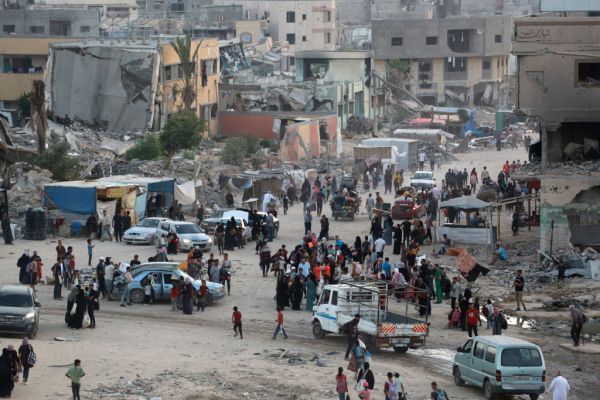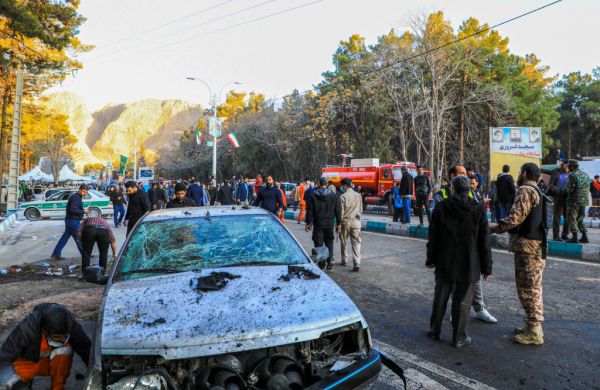The fall of Kabul is not the most important geopolitical event of the 21st century. But it does not have to be for us to recognize that it is part of a larger trend: the erosion of the free world, the rise of authoritarianism, and the descent of world politics into an unbridled, often violent zero-sum contest for power, wealth, and prestige. Such a contest has no winners and leaves the world more violent and poorer, and its people more at risk and less free. It also has only one logical culmination.
Some may argue that Kabul is strategically peripheral, that its fall is survivable, and that it is too small a domino to catalyze a collapse of world order. As an isolated incident, that is true, just as the Russian invasion of Georgia in 2008 or Ukraine in 2013 were survivable, or Syria’s and Libya’s descent into anarchy in 2011, the failure of the war in Iraq, North Korea’s acquisition of nuclear weapons in 2006, the growth of Iran’s near-nuclear breakout capability, and China’s record of genocide, industrial espionage, totalitarian surveillance, and continuous violation of international law.
No straw takes responsibility for breaking the camel’s back. But in retrospect, after the camel is lying paralyzed in the ground, we know that every straw played its part. There is an old adage about how one goes bankrupt: gradually, and then suddenly. We are on the gradual slope to the bankruptcy of world order, and we do not know how close we may be to a precipitous collapse. Any single event, like the fall of Kabul, might be the last. No one could have believed that the assassination of an obscure archduke by a Serbian terrorist would topple three empires, birth the Soviet Union, redraw the map of the modern Middle East, and launch a score of wars in its wake.
Some may argue that world politics has never been anything more than a raw contest for power. Realists of this ilk say that the “liberal international order” was only a mirage, a pretense, or a fable we told ourselves to cast an appealing moralistic gloss over the perennial pursuit of wealth, power, and prestige. The fall of Kabul endangers nothing more than a fairy tale that was, in fact, dangerous for having bred naivete, utopianism, and magical thinking in the halls of power.
This view is too cynical by half. Yes, world politics between the free world and authoritarian powers is and always has been thus, but relations within the free world have been qualitatively different. Among free nations, we built a world of cooperation rather than conflict, a world in which travel, trade, innovation, tourism, cultural exchange, education, humanitarian and religious work, and science were open, legal, free, fair, and cooperative, and thus cheaper, easier, and more successful.
If you cannot recognize this truth, it is because this is the world we have grown up in. It is so familiar that we take it for granted. The fish does not recognize the ocean because it never swam in anything different. The free world is our ocean. Read a book of history that describes what the world was like before, say, 1700; or what the world is like today in China, Russia, North Korea, Iran or, sadly now, Afghanistan, and you will recognize how rare and fragile is the world the United States and its allies built in the 20th century.
But now there are bigger fish—and there is poison in the water. The free world is shrinking: We are nearly 20 years into a continuous democratic decline across the world, according to Freedom House. More importantly than the number of democracies: the proportion of world power wielded by free, accountable governments has shrunk, and that wielded by authoritarian governments grown, over the past two decades. The high point of freedom in human history was probably around 2005, and the tide is now receding.
The rise of China and the modernization of its military is the most dramatic part of the growth of authoritarian power, along with Russia’s military modernization and North Korea’s nuclear weapons. But the devolution of democracies around the world to autocracy, the erosion of international institutions and the creation of new ones under authoritarian control, the fraying of the Western alliance, the 2008 financial crisis, the rise of populist and authoritarian movements in Europe and the United States are all part of this story as well.
That means the fall of Kabul is not an isolated incident. It is one more step along the road the world has been traveling for the past 20 or 30 years. The war in Afghanistan was a large, long, and expensive effort to push back the boundaries of tyranny, terror, and barbarism; to bring one small, poor country into the fold of the free world and thus to prove the concept that even the worst, poorest, most failed state could find a place here. We failed and the bad guys won.
Many people will use the fall of Kabul to argue that the concept has not only not been proven; it has been positively disproven—it proves, for some, that the free world isn’t for everyone, that the free world is weak, that some barriers are too difficult or costly to overcome. The loss in Afghanistan deals a small blow to the aspirations of the free world, to the moral vision it represented, in place of which an alternate vision based on tyranny and terror has more room to take root.
The biggest losers are the Afghans, of course. But the entire world is less safe, less stable, and less free than it was last week. Change in world politics is not linear or steady; it can happen in lurches and sudden starts and stops. We saw in Afghanistan over the past week a dangerous bandwagon effect: Once the Afghan army refused to fight in one province and allowed the Taliban to win uncontested, it become irresistible for the next unit to do so in the next province, and the next, until the Taliban won almost without a fight.
The same dynamic can take hold in international politics. If we are so demoralized that we do not defend the free world in the next contest—in Taiwan, say, or Latvia—then it will be vastly easier not to fight the one after that, and again after that. The rest of the world will quickly believe that the free world has lost its will and the bandwagon toward an alternate vision of world order represented by China and Russia will accelerate. Then, only after all the dominos have fallen, we will have an impossible choice: Succumb to the new order, or choose to fight when it has already become vastly harder, more expensive, more lethal, and far less likely to succeed. We slide toward anarchy gradually—and then suddenly.
Paul D. Miller is a professor of the practice of international affairs at Georgetown University. He previously served on the NSC staff under Presidents George W. Bush and Barack Obama.








Please note that we at The Dispatch hold ourselves, our work, and our commenters to a higher standard than other places on the internet. We welcome comments that foster genuine debate or discussion—including comments critical of us or our work—but responses that include ad hominem attacks on fellow Dispatch members or are intended to stoke fear and anger may be moderated.